Hålogaland
Hålogaland was the northernmost of the Norwegian provinces in the medieval Norse sagas. In the early Viking Age, before Harald Fairhair, Hålogaland was a kingdom extending between the Namdalen valley in Trøndelag county and the Lyngen fjord in Troms og Finnmark county.[1]


Peder Balke
This painting illustrates some of the rugged fjord and island terrain that was Hålogaland
Etymology
Ancient Norwegians said that Hálogaland was named after a royal named Hölgi. The Norse form of the name was Hálogaland. The first element of the word is the genitive plural of háleygr, a 'person from Hålogaland'. The last element is land, as in 'land' or 'region'. The meaning of the demonym háleygr is unknown. Thorstein Vikingson's Saga, 1, describes it as a compound of Hial, "Hel" or "spirit," and "loge", "fire".
The Gothic historian Jordanes in his work De origine actibusque Getarum (also known as Getica), written in Constantinople c. AD 551, mentions a people "Adogit" living in the far North. This could be an old form of háleygir and a possible reference to the petty kingdom of Hålogaland.
Alex Woolf links the name Hålogaland to the aurora borealis — the "Northern Lights" —, saying that Hålogaland meant the "Land of the High Fire",[2] loga deriving from logi, which refers to fire.
In the medieval accounts of Ynglingatal and Skáldskaparmál, "Logi" is described as the personification of fire, a fire giant, and as a "son of Fornjót". In the medieval Orkneyinga saga and the account of Hversu Noregr byggðist ('How Norway was inhabited'), Fornjót is described as king of "Gotland, Kænland and Finnland". The royal lineages sprung from his children are discussed in these and other medieval accounts.
The beginning of the Þorsteins saga Víkingssonar ("Saga of Thorstein son of Víking") discusses King Logi who ruled the country north of Norway. Because Logi was larger and stronger than any other man in land, his name was lengthened from Logi to Hálogi, meaning "High-Logi". Derived from that name his country became called Hálogaland, meaning "Hálogi's land". Eventually the spelling of the name shaped to the modern-day Hålogaland.
The Hversu Noregr byggðist is an account of the origin of various legendary Norwegian lineages. It traces the descendants of the primeval ruler Fornjót (Fornjotr) down to Nór, who is here the eponym and first great king of Norway, who unites the Norwegian lands (petty kingdoms). The Hversu account then gives details of the descendants of Nór and of his brother Gór in the following section known as the Ættartölur ("Genealogies", or Fundinn Noregr, "Founding of Norway"). The Hversu account is closely paralleled by the opening of the Orkneyinga saga.
In 873 AD, according to the Egil's saga (written c. 1240) the Kvens and Norse cooperate in battling against the invading Karelians. The chapter XVII of Egil's saga describes how Thorolf Kveldulfsson (King of Norway's tax chief starting 872 AD) from Namdalen, located in the southernmost tip of the historic Hålogaland, goes to Kvenland again:
That same winter Thorolf went up on the fell with a hundred men; he passed on at once eastwards to Kvenland and met King Faravid.
Based on medieval documents, the above meeting took place during the winter of 873–874. Hålogaland's rather close vicinity to Kvenland is also demonstrated c. 1157 in the geographical chronicle Leiðarvísir og borgarskipan by the Icelandic Abbot Níkulás Bergsson (Nikolaos), who provides descriptions of lands around Norway:
Closest to Denmark is little Svíþjóð (Sweden), there is Eyland (Öland); then is Gotland (Gotland); then Helsingaland (Hälsingland); then Vermaland (Värmland); then two Kvenlönd (Kvenlands), and they extend to north of Bjarmaland (Bjarmia).
Modern usage
In modern times, the term Hålogaland is used in a variety of senses. For some purposes, all of Northern Norway plus Svalbard and Jan Mayen are covered under the term Hålogaland.[1] For other purposes the counties of Nordland and Troms constitute Hålogaland. Hålogaland or even Mid Hålogaland are frequent terms covering the smaller districts of Ofoten, Lofoten and Vesterålen, as well as the municipalities Bjarkøy, Gratangen, Harstad, Ibestad, Kvæfjord and Skånland of Troms og Finnmark county. The term has also been used in this last sense, minus the Lofoten archipelago.
The name is currently used by the Dioceses of Nord-Hålogaland, Sør-Hålogaland, as well as by a Court of Appeal, a theater and a large bridge.
A derived name is Helgeland which refers to southern Nordland.
History
Lofotr Viking Museum
Hålogaland figures extensively in the Norse sagas, and in the Heimskringla, especially the Ynglinga Saga and Háleygjatal. It was inhabited by the race of Hölgi (Háleygja ætt) who was the eponymous hero of Hålogaland.[3]
In the saga, Heimskringla, a man called Gudlög led a number of Norwegian pirates that were fought by the Swedish king Jorund and king Godgest of Hålogaland was given a horse by the Swedish king Adils. The first earl of Lade, Håkon Grjotgardsson, ruler of Trøndelag, came from Hålogaland, and sought to extend his kingdom southwards. Here, he met with Harald Fairhair, and joined him.[4]
Archaeologists have uncovered the Chieftain House at Borg in Lofoten (På Borg på Vestvågøya i Lofoten), a large Viking Era building believed to have been already established around the year 500. Archaeological studies commenced here in 1983 and in 1986–89, a joint Scandinavian research project was conducted at Borg. Excavations brought to light remains of the largest building ever to be found from the Viking Era in Norway, 83 meters long and 9 meters high. The chieftain's seat at Borg is estimated to have been abandoned around AD 950. Today the site is the location of the Lofotr Viking Museum.[5][6][7]
Geography
Hålogaland is a drowned coastline containing extensive mountainous fjords and islands. It was an excellent refuge for Viking ships as well as a way station for voyagers to the White Sea, which offered access to Russia. Even in modern times, Narvik was an important World War II objective. In 2008, the name was proposed as the possible name of an independent Northern Norway.[8]
See also
- Þorgerðr Hölgabrúðr - Goddess strongly associated with Hölgi
- Ottar from Hålogaland - Viking adventurer from Hålogaland
- Thorir Hund - Great chief in Hålogaland
- Gyda Eiriksdottir - Queen consort of King Harold Fairhair
- Hálfs saga ok Hálfsrekka - Legendary saga about Halfr, one of Norway's most famous legendary sea-kings
- Ketils saga hœngs - Legendary saga about chieftain Kettil Trout from Ramsta, Nærøy in Hålogaland
References
- Thorsnæs, Geir. "Hålogaland". Store Norske Leksikon. Retrieved 17 July 2015.
- Woolf, Alex (2007). From Pictland to Alba. p. 51.
- Kristiansen, Roald E. "Vikingetid: Religion i det samiske og norrøne Nordnorge". Archived from the original on 13 June 2014.
- Sandnes, Jørn. "Håkon Grjotgardsson". Norsk Biografisk Leksikon. Retrieved 17 July 2015.
- "Excavations - Lofotr - Vikingmuseet på Borg". lofotr.no. Archived from the original on 24 July 2011.
- "Lofotr Viking Museum at Borg in Lofoten". Visitnorway.com.
- "Lofotr (Viking Museum at Borg)" (PDF). Archived from the original (PDF) on 25 July 2011.
- "Ønsker Nord-Norge som egen stat". Dagbladet. 14 October 2008. Retrieved 17 October 2008.
Other sources
- Woolf, Alex (2007). From Pictland to Alba, 789–1070. The New Edinburgh History of Scotland. Edinburgh: Edinburgh University Press. ISBN 978-0-7486-1234-5.
- Berglund, Birgitta (1994) Helgeland historie (Mosjøen) ISBN 82-90148-55-0
- Bertelsen, Reidar (1985) Lofoten og Vesteralens historie: Fra den eldste tida til ca. 1500 e (Kommunene i Lofoten og Vesteralen) ISBN 978-82-90412-37-6